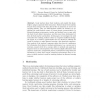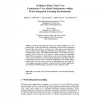265 search results - page 2 / 53 » Not Everything We Know We Learned |
ECTEL
2008
Springer
13 years 6 months ago
2008
Springer
In an empirical study, we provided (or not) pairs of students working in a remote collaborative learning situation with a knowledge awareness tool that provided learner A with lear...
TARK
2007
Springer
13 years 11 months ago
2007
Springer
In the most popular logics combining knowledge and awareness, it is not possible to express statements about knowledge of unawareness such as “Ann knows that Bill is aware of so...
ECTEL
2006
Springer
13 years 8 months ago
2006
Springer
Abstract. Good teachers know their students, and exploit this knowledge to adapt or optimise their instruction. Teachers know their students because they interact with them face-to...
ECTEL
2009
Springer
13 years 9 months ago
2009
Springer
Work-integrated learning (WIL) poses unique challenges for user model design: on the one hand users’ knowledge levels need to be determined based on their work activities – tes...
JMLR
2010
12 years 11 months ago
2010
Supervised learning from multiple labeling sources is an increasingly important problem in machine learning and data mining. This paper develops a probabilistic approach to this p...


